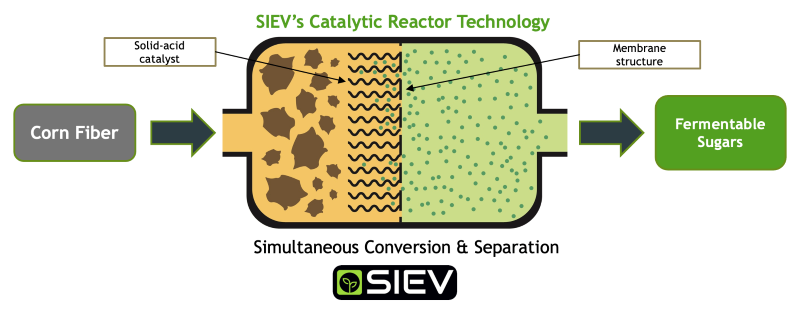SIEV Technologies of Fayetteville has won a $50,000 SBIR Matching Grant from the Arkansas Economic Development Commission to support engineering staff efforts on its National Science Foundation Small Business Innovation Research Phase I project and engage in additional commercialization planning.
Through the Phase I grant, SIEV is developing new technology that converts biomass waste into value-added bioproducts.
SBIR Matching Grant Extends Capacity
SIEV’s CEO Davar Sasongko shared, “The NSF SBIR grant is an exceptional program designed to help companies begin commercializing novel technology. However, companies are limited in their ability to utilize these funds to purchase equipment or fund business development activities. The SBIR Matching Grant will allow SIEV to do just this.
“Not only will we be able to hire and retain engineers on the project, but we will be able to finance business development activities. This includes paying for time and effort to take part in additional customer discovery, and to complete SIEV’s commercialization plan for Phase II. In addition, we were able to purchase needed lab equipment through this matching grant to run experiments for the technical R&D of the technology.”
Over the next few years, SIEV expects to grow skilled, high-wage jobs and promote the overall bio-economy within the state of Arkansas. This includes engineers and scientists in various areas, technical operators, and business support roles such as accountants.

Business Development and the SBIR Program
Sasongko has learned that business development is a crucial component of any business, especially a startup like SIEV.
“Although Phase I of this SBIR is mainly for research and development tasks, having a clear business model, validated target market, interested industry partners, and a robust commercialization plan will increase SIEV’s chances of success and help us obtain a Phase II NSF SBIR grant. The number one reason why startups fail isn’t due to the technology not working, but rather failing to identify the best initial market and creating a product no one wants. The matching grant allows us to allocate time and resources to prevent this from happening,” he said.
ASBTDC Assistance
SIEV Technologies has been a client of the Arkansas Small Business and Technology Development Center since 2020.
“ASBTDC, especially Rebecca Todd, were extremely helpful in helping us complete the application and prepare for the Matching Grant committee presentation,” Sasongko shared. “Without their help, our presentation would not have been nearly as strong and polished as it was. They were also able to help us prepare for any questions that the committee might ask, and proofread our application before submission.”
Next R&D Milestone
SIEV’s first application is within the fuel ethanol industry. “We are developing a bolt-on reactor that can convert a fuel ethanol plant’s corn fiber byproduct into fermentable sugars that can then be turned into more ethanol. Currently, our next milestone is to fine tune the catalyst and reaction conditions within the reactor to handle this corn fiber starting material,” Sasongko said.

Advice for Prospective SBIR Program Applicants
Sasongko advised, “Definitely reach out to Rebecca Todd and the ASBTDC staff prior to preparing any SBIR/STTR proposals. Their help and resources have been invaluable, and they will help you navigate the uncharted, sometimes choppy, waters that is the SBIR/STTR process.”
How You Can Assist SIEV
SIEV is always looking for the next business opportunity or feedstock.
“If anyone in the community would like to explore a partnership or talk in more detail about what we’re trying to do, please feel free to reach out,” Sasongko encouraged.
“In particular, if you know of a low-value biomass waste material — think agricultural waste, food waste, spent coffee grounds, etc. — that is an issue, please let us know! We’d love to test it out and see if it opens more doors and opportunities.”